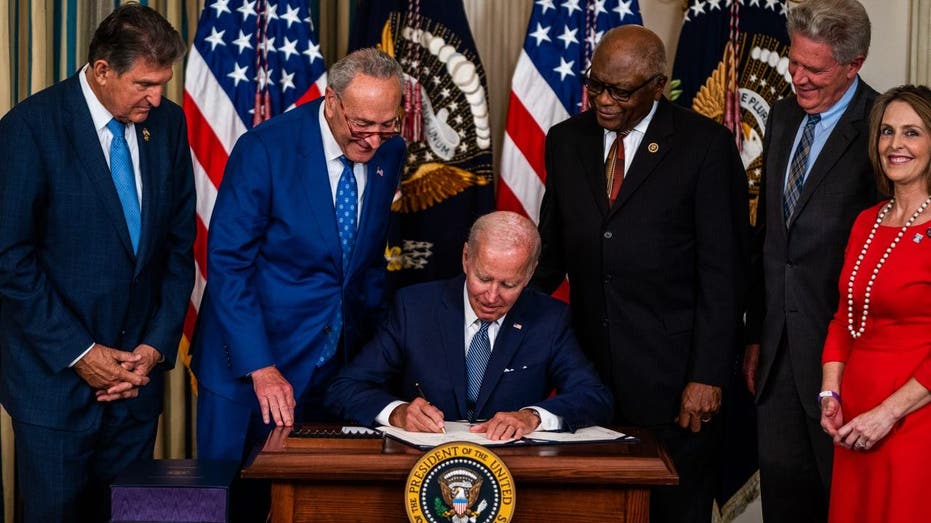Biden admin quietly adds workaround, making pricey sports cars eligible for EV tax credits
The Biden administration tells FOX Business it is 'simply following the tax laws'
Beam Global's EV Arc requires zero ground construction, electrical work
Beam Global CEO Desmond Wheatley explains the cleantech developer's zero-emission, solar-powered electric vehicle charger on 'The Claman Countdown.'
The Biden administration issued guidance Thursday explaining which electric vehicles (EV) qualify for tax credits and included a workaround that allows a wide range of cars to be eligible.
The Department of the Treasury said in its announcement that under the Inflation Reduction Act (IRA), which President Biden signed into law in August, regular consumer EVs would qualify for the commercial clean vehicles credit of $7,500 if leased instead of purchased. The workaround allows dealers or businesses that lease cars to collect the credit on leased EVs that, if purchased, would not be eligible for the tax break.
"In providing today’s guidance, Treasury is simply following the tax laws and the IRA as written," a Treasury Department spokesperson told FOX Business on Thursday evening. "The tax laws governing ownership in a lease situation and what is a legitimate business use — and therefore what would fall under the 45W credit for commercial vehicles purchased for use or lease — are longstanding, settled, and clear."
According to the Treasury Department, a "qualified commercial clean vehicle" is a vehicle made by a qualified maker, acquired for use or lease by a taxpayer and is "propelled to a significant extent" by an electric motor powered by a battery. Any leased EV that falls satisfies the broad requirements and is less than 14,000 pounds would be eligible for the $7,500 credit.
EXPERTS SLAM PETE BUTTIGIEG'S COMMENTS ON EVS: 'A CON JOB'

President Biden listens as Bill Ford, executive chairman of Ford Motor Company, speaks during the Detroit Auto Show on Sept. 14. (AP Photo/Evan Vucci / AP Newsroom)
The interpretation of the definition of commercial vehicles allows consumers to sidestep the far more stringent requirements implemented by the IRA that EVs must meet to be eligible for the credit if purchased. To be eligible under the new law, purchased EVs must have undergone final assembly in North America; cost less than $55,000 or $80,000 for vans, sport utility vehicles (SUV) and pickup trucks; and be purchased by an individual with an annual income of less than $150,000 or a family with an annual income of $300,000.
Additionally, the Biden administration said it would begin enforcing a fourth qualification for purchased EVs in March. The qualification states that at least 40% of the critical minerals in a purchased EVs' battery must have been extracted or processed in the U.S. or a country which has a free-trade agreement with the U.S.
Sen. Joe Manchin, D-W.Va., who played a large role crafting the IRA's EV tax credit requirements and pushing the bill, slammed the Treasury Department's announcement on Thursday, arguing it would allow companies to exploit loopholes. He added that he would author new legislation during the upcoming Congress to clarify the intent of the law.
ELECTRIC VEHICLES AND CHARGING STATIONS FUEL CYBERSECURITY CONCERNS
"The information released today from the Treasury Department outlining how they will be implementing the commercial and consumer EV tax credits bends to the desires of the companies looking for loopholes and is clearly inconsistent with the intent of the law," Manchin said in a statement after the guidance was issued Thursday. "It only serves to weaken our ability to become a more energy secure nation."
Manchin also criticized the administration for delaying implementation of the critical mineral provision until March, saying he "cannot fathom why the Biden Administration would issue guidelines that would ensure we continue on this path" and noting the IRA stated the rule must be in place by Jan. 1, 2023. Hostile nations like China and Russia dominate global critical mineral supply chains that are vital for EV production.

President Biden signs the Inflation Reduction Act as Sen. Joe Manchin, D-W.Va., left, and others watch on Aug. 16 at the White House. (Demetrius Freeman/The Washington Post via Getty Images / Getty Images)
While eligibility for many EVs when purchased is set to expire in 2023 under the IRA, the guidance Thursday means tax credits will ultimately still be able to be collected on expensive sports cars when leased. The federal government previously issued a long list of EVs, which included cars made by high-end brands like Bentley, Ferrari, McLaren, Mercedes-Benz and Porsche, that qualify for the credit if purchased in 2022 or earlier.
For example, the Bentley Bentayga Hybrid SUV — the starting price of which is about $167,000, according to Car and Driver — is eligible for a $7,500 commercial clean vehicles credit if leased under the Treasury Department's guidance.
GET FOX BUSINESS ON THE GO BY CLICKING HERE
In addition, the Ferrari 296 GTB which costs nearly $323,000, the McLaren Artura which costs about $237,000, the Mercedes-Benz which costs $105,000 and the Porsche Taycan which costs $84,000 would all similarly be eligible for a credit.
"These are lawn ornaments for most people. It's to show that you're a good person because you have an electric Mercedes," Dan Kish, a senior fellow at free-market think tank Institute for Energy Research, told FOX Business. "That kind of virtue signaling — when people are just struggling to get by — is just the sort of elitist mentality that seems to surround a lot of the whole green agenda."
"Even when you put boundaries around it, as we were told they did, it turns out the Treasury Department simply writes its own rules," he added.





















